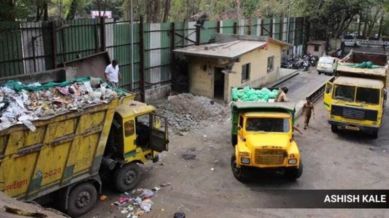Click here to join Express Pune WhatsApp channel and get a curated list of our stories
From Bavdhan to Tekdis: How Pune’s garbage problem is sparking a civic movement
arted by four friends distressed by the state of the city’s rivers, the volunteer-driven initiative combines jogging with litter pick-up — “plogging”

By Viraj Mandar Paranjape
Seven years ago, when Bavdhan’s residents first came together, it was not garbage but electricity outages and traffic chaos that dominated their discussions. In 2018, as the Chandani Chowk project brought construction dust, delays, and accidents, citizens realized the need for a collective voice. From that spark, the Bavdhan Citizens Forum (BCF) was born—a free platform where residents could raise civic issues that everyone faces but few act upon.
“Our idea was simple, good work does not go on in isolation. We Bavdhankars know the ground reality, but we need to take everyone along as stakeholders,” says Deepa Prabhu, co-founder and director of BCF.
Once electricity and traffic issues stabilised, the forum turned its attention to encroachments, pollution, and most urgently — waste.
Bavdhan’s unique topography, surrounded by NDA land, hills, and the busy highway, made dumping and littering a persistent menace.
Plastic bottles, food waste from dhabas, and open garbage piles became a daily sight. BCF decided to tackle waste at its roots. Going beyond the usual dry-wet segregation, it mapped the entire chain — garden waste, e-waste, hazardous waste, plastics, metals, even thermocol. “Waste is a resource,” says Prabhu. “Recycle it instead of dumping it and harming the environment where we and future generations will be living,” she added.
The forum launched the “Zero Waste Community” initiative, which set up systems for recycling old clothes, plastics, metals, paper, and thermocol. This is collected in partnership with NGO SunFoams since PMC does not accept thermocol or glass. Over the last eight months, housing societies have begun storing e-waste, plastics, and thermocol in designated areas, from where Poornam Ecosystem picks it up twice a month. Composting pits are now active in most societies, handling wet and leaf waste locally. E-waste and recyclables are collected systematically. Biogas plants remain a challenge, with maintenance still dependent on PMC machinery, but awareness is spreading fast.
“We have reached 75% of Bavdhan; only a quarter is left to be trained in segregation and composting methods,” Prabhu says.
The forum has also worked on everyday behavioral shifts. Weekly vegetable markets in Bavdhan now see customers carrying Rs 10 cloth bags made from recycled fabric by women’s self-help groups. The initiative has reduced plastic use while creating livelihoods. BCF conducts sessions in societies showing how waste begins at home. “If you donate food or clothes to staff and they throw it away, the source of that waste is still you,” one volunteer explains. Campaigns stress the mantra: Recycle – Remake – Recharge.
A resident points to clean stretches in Tapovan Lane, Insultown Corner, and Ranwara areas as “report cards” of BCF’s work; places where open garbage piles have nearly disappeared. Manish Dev, a BCF member, coordinates directly with the solid waste department to fast-track problem solving.
“The nature of waste is cyclic,” Prabhu says. “It keeps building every minute. No third-party system can manage it alone. Self-awareness is the only real solution.”
Their message is simple: plant a tree, recycle, refuse plastic, or just carry a cloth bag. “These may look like small steps, but they create a lasting impact,” Prabhu concludes. “Don’t indulge in blame games. Come together as one community, without boundaries, and build a better future for Bharat and the world.”
Pune Ploggers
If Bavdhan has made waste management a community habit, Pune Ploggers have turned it into a movement of fitness and civic pride. Started by four friends distressed by the state of the city’s rivers, the volunteer-driven initiative combines jogging with litter pick-up — “plogging.”
With over 2,500 active members and 15,000 followers, the group has carried out 590+ campaigns, collecting nearly 9,500 tons of litter from hills, riversides, and city streets. Their “chalk of shame” campaign—circling cigarette butts and spit marks on JM Road, FC Road, and Alka Chowk—has sparked online debates about civic irresponsibility. Volunteers, often 40–50 at a time, pick up an average of 15–17 bags of dry plastic and bottles each weekend.
At FC Hill alone, they once cleared 800 kg of glass bottles. Ganpati festivals see them collecting nirmalya and shadu clay for reuse, while school sessions raise awareness on menstrual waste and plastic-free alternatives.
“Changing one’s mindset and habit has been the best reward,” says Harsh Jain. The group now dreams of scaling up into a “Plog Yatra” linking two cities for one clean-up cause.
Samvardhan
If plogging blends fitness with activism, Samvardhan is the story of young citizens reclaiming Pune’s hills. Formed in August 2024 by a group of commerce students, the initiative began with cleaning hangout spots like ARAI, Law College tekdi, and Symbiosis Hill.
Since hills fall under the Forest Department and not the PMC, garbage collection often goes ignored. Samvardhan’s 200 volunteers, all aged 18–26, have filled that gap collecting over 200 kgs of waste and ensuring it reaches recycling channels every month. With support from colleges, corporates, and even a former environment minister, the group now plans to expand from hillsides to riverside roads. “Hills are the lungs of the city. If no one is responsible, we’ll take responsibility,” says co-founder Ameya Kokate.
Click here to join Express Pune WhatsApp channel and get a curated list of our stories